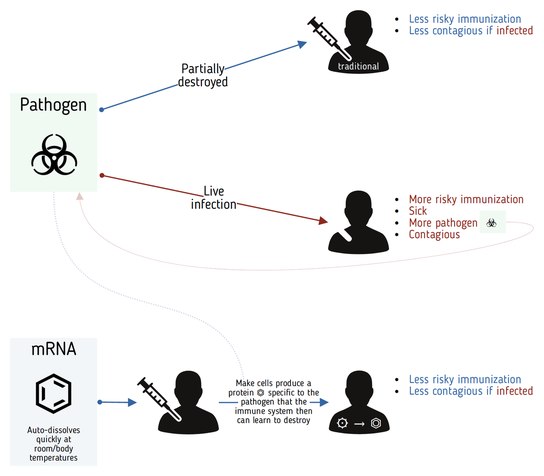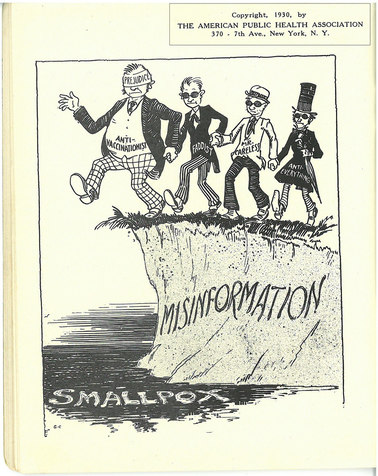Comments
-
The moral character of Christians (David Lewis on religion), doesn't have anything to do with me in particular, nada.
here, here, here, ... (has to do with moral character and such)
to find meaning, purpose, and morality — Hanover
Why morality? History (including legal cases) and living are the better teachers. I suppose you might find moral lessons in religious tales (if that's what you meant). -
Coronavirus, what's with the discontinuity? Not going to remind by going back and quoting comments.
Scrolled by, might speak to your sentiments, don't know ...
- A new coronavirus vaccine heading to India was developed by a small team in Texas. It expects nothing in return. (Dec 30, 2021)
- Corbevax (vaccine)
No patents, reminding of Salk's polio vaccine. I guess we'll see what comes of it.
So ...
would you actually like to join Strang and his many colleagues around the world?
Recently I've been listening to Vinay Prasad, Stefan Baral, Martin Kulldorff, Jay Bhattacharya, Norman Fenton, Pete Doshi, Paul Hunter... Or are they the 'wrong' experts? — Isaac
Just those? -
Coronavirus, do I have to repeat again?
- the scandals, failures, conspiracies, malaria, poverty, General Motors, ...
- the task at hand (like what Strang and colleagues around the world does)
Feb 27, 2021 Children with long covid
Apr 28, 2021 7 Effects of the COVID-19 Pandemic on Kids
Dec 27, 2021 New York City sees four-fold increase in COVID-19 hospitalizations among kids
Dec 28, 2021 Child Covid hospitalizations are up, especially in 5 states
↑ take care of your 5-year-olds out there
So ...
would you actually like to join Strang and his many colleagues around the world? -
The moral character of Christians (David Lewis on religion)Isn't the main topic (assent to) neverending damnation?
It has been, and is, upheld by some.
And the topic has moral implications (whether upheld by one or billions). -
The moral character of Christians (David Lewis on religion)The Nazis didn't think so, obviously. — baker
That's too bad, especially for the victims. -
CoronavirusAgain, , the two mentioned things aren't the same.
On February 6, 2014, General Motors (GM) recalled about 800,000 of its small cars due to faulty ignition switches, which could shut off the engine while the vehicle was in motion and thereby prevent the airbags from inflating. The company continued to recall more of its cars over the next several months, resulting in nearly 30 million cars recalled worldwide and paid compensation for 124 deaths. The fault had been known to GM for at least a decade prior to the recall being declared. As part of a Deferred Prosecution Agreement, GM agreed to forfeit $900 million to the United States. — General Motors ignition switch recalls
As an aside, would you actually like to join Strang and his many colleagues around the world? (They differentiate.) -
The moral character of Christians (David Lewis on religion)Am I really alone here in this? — frank
Well, no. (In my case anyway.) In practical terms ...
People don't often say they assent to neverending damnation, that I know of; seems almost comically embarrassing.
(Though some indoctrinate children so.)
If they admit assenting to neverending damnation, then we may express repugnance, and maybe vote them off "the ethics board".
Outside of that, they (or most anyone) remain "innocent until proven guilty" if you will.
As an aside, I know a few people whose moral judgment often derive from the Bible or the Quran.
They often evaluate moral matters so-and-so because their religious text says this-and-that.
To me, that's forfeiture of autonomous moral agency, to have their text define morals for them.
In principle at least, autonomous moral agency is a prerequisite for (would-be) autonomous actors.

Whatever rules they pick up from their text doesn't somehow absolve them.
In any given situation they still have to figure out if going by their text is the right thing to do.
Fortunately, when probing a bit, most still have (some) autonomous moral agency, and that's kind of reassuring.
Lewis' case is strong enough that it can't just be dismissed with a hand wave. -
The moral character of Christians (David Lewis on religion), church affiliation has been decreasing in the US
Oct 17, 2019 · In U.S., Decline of Christianity Continues at Rapid Pace
Dec 14, 2021 · About Three-in-Ten U.S. Adults Are Now Religiously Unaffiliated
and in some other places
Apr 05, 2017 · Christians remain world’s largest religious group, but they are declining in Europe
Jun 13, 2018 · 2. Young adults around the world are less religious by several measures
Jun 13, 2018 · 3. How religious commitment varies by country among people of all ages
The US has been and is an outlier if you will
Jun 13, 2018 · 1. Why do levels of religious observance vary by age and country?
I doubt it's because they've been reading "Divine Evil" and such, though. :)
But, anyway, what Pew calls "the religious landscape" has been changing some. -
The moral character of Christians (David Lewis on religion), you don't think realizing that neverending damnation is immoral could cause a belief revision of some sort (contra voluntarism)?
Maybe, maybe not, getting into psychology...
, Christianity was not any one particular single movement in the first centuries after Jesus' demise (≈ 30-40).
There were all kinds of zealous factions and cults and whatnot fighting each other and, well, anyone really, often refusing to discuss things for that matter.
And this continued after Constantine's (272-337) organized efforts to get them all together under Roman Catholicism and do away with the rest.
Celsus found them a nuisance, and Origen later complained about Celsus.
Theodosius I (347-395) officially decreed them "dementes vesanosque" (demented lunatics) in 380 — everyone but the Roman Catholics of course, since they were now rubber-stamped by the empire, or more accurately, Roman Catholicism was now part thereof.
Backing by the empire and its resources was a "seismic" turning point in history (to use one historian's word).
And, naturally, another few centuries later yet another religion hit the market with Muhammad, swiftly splitting up into two factions due to some succession disagreement.
It's a bloody story laced with fanatics, strife, and antisemitism, not a mere neat story about the righteous innocents being persecuted.
The Romans tried to deal with the cesspool of zealous cults, countryside preachers, resentment/dissidents, etc, of Middle Eastern antiquity, in their brutish ways, yet Christianity (Catholicism) outlived the empire, and so here we are, with some folk raising Jesus to divinity and perfection, and apparently assenting to neverending damnation. -
The moral character of Christians (David Lewis on religion)Early Christian church fathers didn't take the Bible literally. Fundamentalism came later. — frank
Why do you say that?
In that day true and full happiness shall be the lot of none but the good, while deserved and supreme misery shall be the portion of the wicked, and of them only. — The City of God by Augustine (354-430)Wherefore in order that the happiness of the saints may be more delightful to them and that they may render more copious thanks to God for it, they are allowed to see perfectly the sufferings of the damned. — Summa Theologica by Aquinas (1225-1274)Wherefore as the saints will rejoice in all goods, so will the damned grieve for all goods. — Summa Theologica by Aquinas (1225-1274)
Anyway, it's fairly clear that people have believed (and some do believe) neverending damnation.
To know a person's moral character, we look at that person's ACTIONS. — frank
:up: Yep (and what they say). Of course, blanket-dehumanizing is bad.
doxastic involuntarist — Srap Tasmaner
Right, for the most part anyway. Morals are performative, prescriptive, though. Decision-making is involved. If someone expresses assent to neverending damnation, then we may express repugnance.
Well, either way, I'm not seeing Christians being taken to the guillotine (even if they express assent to neverending damnation), and certainly wouldn't want to. Hmm...then again, there was that case...
Finnish Lawmaker Faces Trial for Hate Speech After Quoting the Bible About Homosexuality (Apr 30, 2021) -
The moral character of Christians (David Lewis on religion)taboo — Banno
Noticed that as well. Has it become politically incorrect to criticize assent to neverending damnation? :brow: Lewis' note is fairly specific (sometimes excruciatingly); wouldn't you expect responses to be on-target?
I concede that the neglected argument doesn’t apply against deism. — Divine EvilMost Christians follow a version of the religion that is committed to divine evil, evil perpetrated by God. Most, therefore, fall afoul of the neglected argument. Perhaps some do not. Perhaps some are inclined to accept the universalist fantasy I have just outlined. Can that count as a genuine style of Christianity? I shall leave that for the theologians to decide. — Divine Evil
But none of this means that Christians should be burned at the stake of course. :wink:
I don't think Christians, by and large, actually believe the things they say they believe. I think the simplest explanation for why the things they say make no sense to a secular audience is that they things they say make no sense. — Isaac
:up:
There could be dissonance involved. (After all, the Bible also tells tales of supernaturally feeding 5000 and 4000 people with a handful of food, which continues to be preached to children.)
Allah the merciful — Agent Smith
There is some ambiguity, though it seems eternal torment is the most common belief among Muslims. The Quran displays the usual contrast between (their versions of) heaven and hell.
Quran 4:13-14, 4:56-57 :fire: (graphic violence), 4:93, 4:122, 4:137, 4:168-169, 5:37, 5:72-73, 7:179, 18:105-106, 67:7 :fire:, ... -
Coronavirus
-
The moral character of Christians (David Lewis on religion)If Christians believe that the Biblical Yahweh/Jesus has set out what they should think and do or what's in/correct, then interpretation becomes a risky game, doesn't it, whatever their personal preferences are irrelevant?
-
CoronavirusYes, we do. We also have a malaria crisis to deal with, an obesity crisis, an opioid crisis, an AIDS crisis, a poverty crisis, a TB crisis, a diarrhoea crisis, a child labour crisis... — Isaac
Goodie, let's keep up our pandemic stomping efforts. :up: Containing, tracking, learning, ...
Dec 01, 2021 WHO recommends malaria vaccine for children - malaria
Dec 02, 2021 First Malaria Vaccine a Major Milestone Despite Hurdles Ahead - malaria
Dec 06, 2021 More malaria cases and deaths in 2020 linked to COVID-19 disruptions
Dec 10, 2021 Communication between immune cells shows potential for cancer vaccine - cancer
Dec 10, 2021 Scientists developed Promising and safe mRNA HIV vaccine :up: AIDS
Dec 18, 2021 I want to build muscle and lose belly fat. A nutritionist said to eat more protein and snacks. - obesity
Dec 19, 2021 Outgoing NIH director implores Fox News viewers to stay focused on the real 'enemy' :up: good advice
Dec 20, 2021 FDA approves first injectable PrEP medication to lower HIV risk - AIDS
Dec 20, 2021 BioNTech's mRNA Cancer Vaccine Has Started Phase 2 Clinical Trial :up: cancer
Dec 20, 2021 34 healthcare and biotech startups that are set to take off in 2022, according to top investors :eyes: watch?
Dec 21, 2021 FDA approves first injectable HIV prevention drug - AIDS
Dec 21, 2021 Criminals have stolen nearly $100 billion in Covid relief funds, Secret Service says :angry:
Dec 22, 2021 Covid Deaths Exceed Annual Death Toll of HIV, TB and Malaria
-
CoronavirusI think this image is accurate enough for lay-persons:

Please let me know if you spot anything. -
Coronavirus, everybody knows about the contemptible scandals, and that they ought to be dealt with.
Meanwhile we have a pandemic to deal with, which is kind of important enough.
Even if those companies (and facemask, hand sanitizer, horse dewormer companies) had conspired to create and deliver the virus worldwide (which they didn't), we'd still have to deal with the darn thing. :meh:
I'll venture a guess... If you put together a new opening post making a case for dealing with those scandals/companies, then it'll likely be fairly quiet, because most already agree. How to deal with them (not if) would more be up for debate. -
How Useful is the Concept of 'Qualia'?We could speak of an experience and of the experienced.
Sometimes they're the same, other times not.
When they're not, we tend to say the experienced is objective.
Experiences themselves are usually said to be subjective, and in a format we call qualia or whatever.
If I'm talking about my like of coffee, or an annoying headache, then the experience and the experienced are the same.
If I talk about the coffee, or the bump on my head, then they're not the same.
Then there are the errors...
A hallucination or phantom pain is when thinking the experience and the experienced aren't the same, but they are.
Idealism is thinking they're always the same, but sometimes they're not; talk about self-elevation/universalization.
And the occasional category mistakes...
Experiences are occurrences, more clearly temporal, are interruptible (interaction/event-causation), come and go, i.e. process-likes.
The experienced are often more clearly movable, locatable, breakable (under conservation), i.e. object-likes.
So, when we perceive things, process-likes are involved, interaction, causation, or something; it's not like we become the experienced, or have to.
At a glance, I don't see anything plain wrong with that account, but I do see some things going awry when ignoring parts of it. -
CoronavirusI was pitching for up-against-the-wall-come-the-revolution, but yeah...nationalise sounds more pragmatic! — Isaac
That could work, though I don't know about large international companies.
(Now wait for someone to yell "Communism!", "Theft!" :grin:)
Jail time for employees that can be held accountable, board members, ...
Being health-related means serious enough, laissez-faire capitalism won't do.
Anyway, a bit peripheral here, might warrant a new opening post, though I'd expect most to be disgusted about the scandals.
Some high profile scandals, might have been posted before ...
• Bristol-Myers Squibb to Pay More Than $515 Million to Resolve Allegations of Illegal Drug Marketing and Pricing (Sep 28, 2007)
• Merck to Pay More than $650 Million to Resolve Claims of Fraudulent Price Reporting and Kickbacks (Feb 7, 2008)
• The Case Against Pfizer (Sep 2, 2009)
• Pharmaceutical Giant AstraZeneca to Pay $520 Million for Off-label Drug Marketing (Apr 27, 2010)
• GlaxoSmithKline whistleblower awarded $96m payout (Oct 27, 2010)
• GlaxoSmithKline to Plead Guilty and Pay $3 Billion to Resolve Fraud Allegations and Failure to Report Safety Data (Jul 2, 2012)
• Johnson & Johnson to Pay More Than $2.2 Billion to Resolve Criminal and Civil Investigations (Nov 4, 2013)
• Lessons from GlaxoSmithKline’s record $492 million bribery fine in China (Sep 23, 2014)
-
CoronavirusAt this forum, not once have I seen that a pro-vaccer said that people should get vaccinated for their own sake.
Not once has anyone who has told me to get vaccinated said that I should do it to protect my health.
Not once. Not a single time. — baker
?
You yourself quoted
The vaccine significantly reduces the odds that you will catch it - and if you do catch it the vaccine significantly reduces the odds that you will have a serious case. — EricH
And that's definitely not the only time that's been posted.
Apparently, one of those things that don't sink in with some people.
You could at least try to keep it coherent. -
CoronavirusYou're forcing us into mediocrity, into thinking like gamblers, mobsters, and drug dealers. Into narrow-mindedness and hard-heartedness. Into moral depravity. — baker
? -
Coronavirus800th time, a vaccine doesn't have to be perfect to be relevant. — Cheshire
:up:
A good 250 pages in, I wonder how many times repetitions have been posted.
None of it stops the spread of coronavirus. — NOS4A2
Do you think there is some magical spell that stops the virus?
It's about stemming the tide, containing, tracking, learning.
Some of your comments can't be differentiated from paranoia.
How long were they expected to be interned (and for what intent)? — again again again
Your line of thinking exits before getting to duration and intent (asked more than once).
Anyway, I, for one, would like to stomp the virus (unlike @Book273 apparently), and move on.
Maybe this is a good time to separate doers and deniers? -
CoronavirusFYI, Chris (Simpsons artist) has advice
• how to wear your mask
• coronavirus - how to wash your hands -
CoronavirusMaybe you missed it, , the same bullshit is definitely still present 90 years on.
Right, yeah, the inequalities are problematic and ought be addressed.
But do go on about your blanket "Big Pharma" hatred. :) (don't think anyone are cheering them on for the scandals) -
CoronavirusWhat fear and panic is that?
Elsewhere I once asked a denier what they'd expect in case of an outbreak.
Their response was looting, riots, chaos, violence, ...
According to them, that's they'd picked up, read, been told, figured, ...
Someone had lost contact with the ground.
There's no particular panic, and the only supposed "fear-mongering" has come from some folk rehashing worst-case scenarios.
If someone is afraid out there, then that's understandable enough, and that's where that ends.
In the two places I call home (different continents), people just follow protocols and go on about their day. :shrug: -
CoronavirusDifferent day in 1930, same bullshit 90 years later:

Everyone's screwed.
Those who don't learn from history, repeating the mistakes.
And those who watch them. — paraphrasing George Santayana and David Linwood -
Coronavirus, what the story doesn't report, is whether the kids and their peers were properly informed.
Snatched off the street at gunpoint (like your comments may suggest)?
Treated well enough and kept in the loop?
Since it's Australia, I'm guessing a reasonably civilized/humane approach, but maybe not? -
CoronavirusThey tested negative. They contained exactly zero SARS-CoV-2. — NOS4A2
... What do you think they were trying to ascertain?
Thus, they were off to the quarantine centre, like others, per their protocols.
I guess the Aussies put a thorough+swift protocol in place for pandemic containment/tracking, which seems sensible enough.
Did you think it was just fun and games (or "Obergruppenführer Michael Gunner" executing nefarious endlösungs)?
How long were they expected to be interned (and for what intent)? — again again -
Coronavirus
-
Coronavirus
-
Coronavirus:grin:
Italian man tries to dodge Covid vaccine wearing fake arm (Dec 3, 2021)
A new market for silicone prosthetics?
"Want to hit the bar scene unvaccinated? We can help." -
Coronavirus:up:
The arrival of coronavirus just ahead of the presidential election of 2020 seemed like "the most fortuitous pandemic in the history of the world" for the Democratic Party, recalls Mark [Valentine]. — Pro-Trump counties now have far higher COVID death rates. Misinformation is to blame (Dec 5, 2021)
I guess there's no accounting for adults that haven't grown up.
Fortunately others do.
Phil Valentine’s family urges listeners to get the shot — Tennessee radio host doubted and mocked vaccines – now he has Covid (Jul 24, 2021) -
Coronavirus:roll:
Three teenagers from the indigenous Binjari community recently escaped from one of Australia’s internment facilities — NOS4A2The facility seems a frightening place — NOS4A2Obergruppenführer Michael Gunner — NOS4A2
Were they interned in order to send them to the gas chamber?
How long were they expected to be interned (and for what intent)?
Denying fundamental rights on a hunch is ludicrous. — NOS4A2It's not a hunch. — Benkei
@NOS4A2, your skewed verbiage betrays an ideological ulterior motive.
SARS-CoV-2 doesn't care. -
Is magick real? If so, should there be laws governing how magick can be practiced?A state monopoly on magick enforced by clairvoyant tactical police units. — jamalrob
Some are ahead of you:
Saudi Arabia's War on Witchcraft (Aug 19, 2013)
Saudi religious cops trained to fight magic (Feb 2, 2016)
Supernatural magic(k) is fiction, imaginary, found in fantasy stories and tall tales (and here sort of).
Those Saudi Arabian accused are therefore innocent of those charges.
So trivial it is to imagine a glass of wine materializing in my hand out of the blue, though. -
Rittenhouse verdict, OK, so "child rapist" was just your slant on it, not related to Rittenhouse's goings-and-doings. (Perhaps even to justify the kill (like a "good riddance" type thing)?)
Old school shootouts are in order. — Hanover
Hey, old-old-school fisticuffs are safer for others. :strong: ;)
I have a shelf of battle-ready swords sitting right over there. :point:
Were I to wield one out on the town, I might just get picked up by the cops.
Maybe not in Wisconsin? -
Rittenhouse verdictThe child rapist who first attacked Rittenhouse assumed, wrongly, that Rittenhouse wouldn’t defend himself. — NOS4A2
Did Rittenhouse know him?
Do we want kids seeking out such situations, armed with semi-automatics? :down:
We have an example here.
What's gone awry, and what to do about it?
, try yelling " :fire: " there. :D -
Rittenhouse verdict
-
Rittenhouse verdict

In such scenarios, I might want something heavier.
Especially for defending my home, but also a deterrent in general.
Don't think 20mm will do. Grenades, too, definitely.
Yes yes, that's escalation, but I have a god-given right to defend myself. Against all of them.
Do you know how many heavily armed gangs are out there? And dangerous lunatics?
And, for proven deterrent, I'd want setups with mutually assured destruction.
That's safety. Then there will be peace. One way or other.
jorndoe

Start FollowingSend a Message
- Other sites we like
- Social media
- Terms of Service
- Sign In
- Created with PlushForums
- © 2026 The Philosophy Forum



